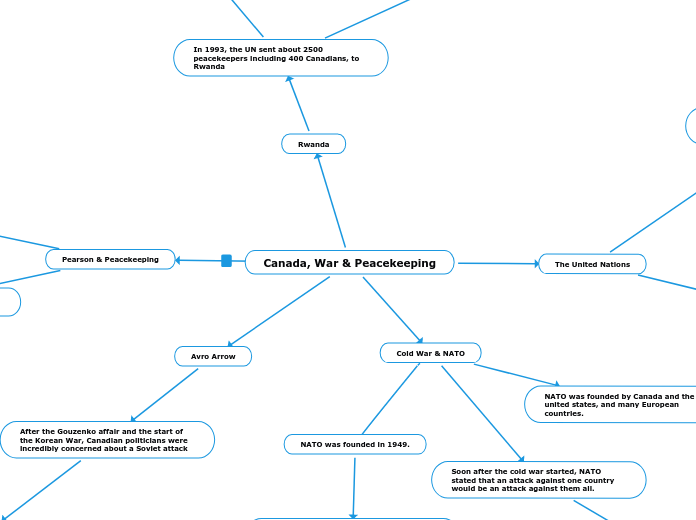por Nicholas Farkas hace 4 años
309
Canada, War & Peacekeeping

por Nicholas Farkas hace 4 años
309

Ver más
A peace agreement had been reached, and the peace keepers mission was to make sure that the agreement was respected.
Then in 1994, an airplane carrying the Rwandan president Juenal Habyarimana, Hutu, was shot down
This was blamed on the Tutsis many Hutus went on a murderous rampage, killing Tutsis, as well as Hutus who criticized the government
over the next 100 days 800 000 people were killed and over 90% were Tutsis
Romeo Dalleire had warned UN officials of the risk of genocide
Romeo Dalleire pleaded for reinforcements and asked permission to seize Hutu weapons but his requests were ignored
When the genocide had started the UN peace keepers tried to protect as many people as they could but their small force could do little.
Prior to the war ending delegates from 50 countries gathered in san Francisco in June 1945 to create the United Nations.
These Delegates represented 80% of the worlds population.
6 months later, 26 allied nations signed a declaration stating that none of them would break ranks to negotiate peace with the axis powers.
Pearson was not the first person to think of making a international peacekeeping force, but he was the most capable
Pearson was given overwhelming support from the UN's general assembly "to secure and supervise the cessation of hostilities"
A Canadian general , E.L.M. burns, led the first international peace keeping force, called the UNEF
In 1953 the government agreed to pay for the development of a new aircraft.
On October 4th 1957 a huge crowd gathered at Malton, Ontario, for the presentation of the arrow to the public and press.
A Canadian aircraft company took on the job of making this new plane the company's name was A.V. Roe Canada.
The Arrow's costs began spiraling, and on February 20th, 1959, Diefenbaker cancelled the program.
More than 15 000 A.V. Roe employees were laid off and the company was ruined.
In 2009, the NATO force in Afghanistan numbered about 50 000 troops from 41 countries, including all 26 NATO members. Canada had deployed 2500 troops.